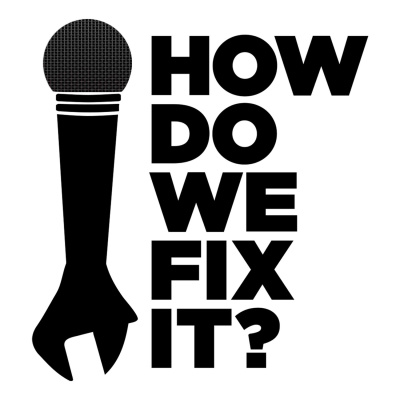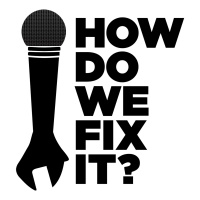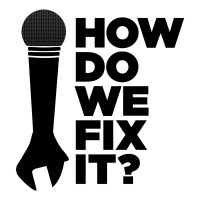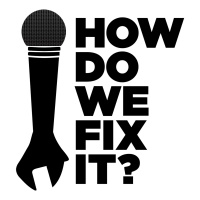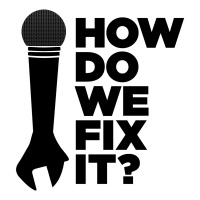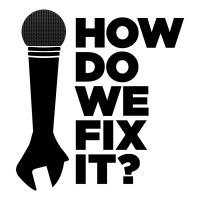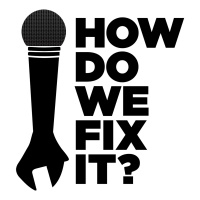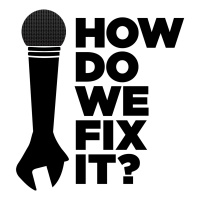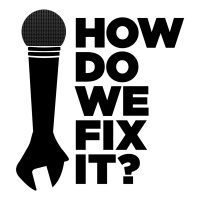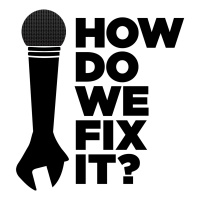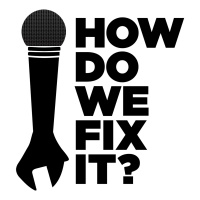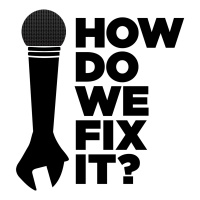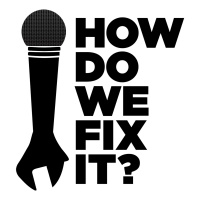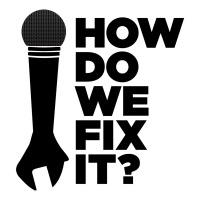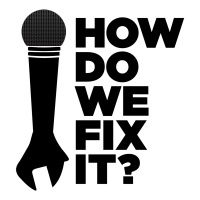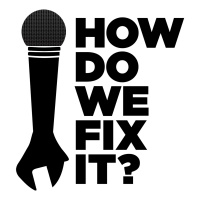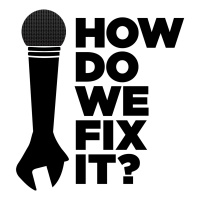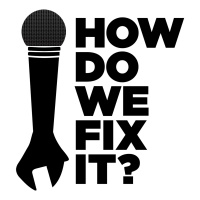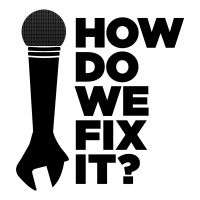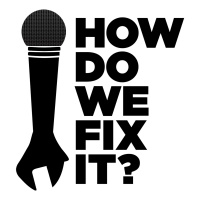Synopsis
From politics to the personal, we're about solutions. Our weekly podcast features two friends and longtime journalists. Join Richard Davies (ABC News) and Jim Meigs (Popular Mechanics) as they challenge authors, experts and provocateurs in a search for positive, practical ideas. Guests include Alan Dershowitz, a noted legal scholar and defender of civil liberties; Mike Rowe of "Dirty Jobs" and Lenore Skenazy, founder of "Free Range Kids." Topics include politics, parenting, personal finance, human behavior and much more. "How Do We Fix It?" - a repair manual for the real world. Produced by DaviesContent
Episodes
-
Bridging Divide Renewing Democracy: Minnesota
26/10/2018 Duration: 30minPolarization is tearing us apart. Bullying and bluster are two of the most common ingredients in American democracy.How can we renew democracy and restore the sort of trust that is essential for governance? This episode looks at the constructive and energetic responses of two local and national groups in Minnesota.We visit a Living Room Conversation discussion on race at Minneapolis Community and Technical College, and speak with the co-founder of Better Angels, Bill Doherty, a University of Minnesota Professor, who is working with others to bridge partisan divides.We also meet Tiffany Wilson-Worsley, a family and community specialist in Minneapolis, who works as a facilitator for discussions on race relations."We have this pervasive need to be human with one another," she says. "There are so many divides, and I think the goal is to bring us all together to get to know one another, but also to grow together."Both groups promote guided conversations in a safe space, and estab
-
Bridging Divide: Iowa Civility Workshop
18/10/2018 Duration: 24minAmerican democracy is in crisis and politics have become weaponized with name calling and personal attacks. Trust in national institutions and the media is at an all-time low. Congress and The Supreme Court are much more likely than in the past to cast predictable party-line votes. As a nation we are failing to make creative solutions, based on compromise.This episode is the first of three to report on local efforts that push back against the toxic impact of tribalization and political polarization. "This is not just a shake our fists at what Donald Trump has brought to our national discourse," Kathie Obradovich, Opinion editor at The Des Moines Register, tells us. "It goes deeper to our ability to speak to and understand each other.""People who used to put party politics aside and work for common interests are just fewer and fewer. The number of prominent moderates in Iowa politics I can count on one hand."In this episode, we report on the work of Revive Civility Iowa,
-
Bridging Divide. Renewing Democracy: Carolyn Lukensmeyer
11/10/2018 Duration: 22minNever before in living memory has America been so deeply divided, and this paralysis threatens to weaken and corrode democracy. Ideological silos have become much more common among both conservatives and liberals.One opinion poll says 7 in 10 Americans believe that our politics have reached a dangerous low point. And most say the climate is a new normal— not temporary.This is the first of four “How Do We Fix It?” episodes leading up to the Midterm Elections that discuss local and national attempts to push back against political dysfunction and the lack of rational, respectful debate. Forthcoming episodes will report on new initiatives in Iowa, Minnesota and North Carolina.Carolyn Lukensmeyer, is a leader in the field of deliberative democracy and social entrepreneurship she is the Executive Director of the National Institute for Civil Discourse.“Voters are frustrated, worried, and angry with their leaders and ashamed of how our political process works these days. Heated rhetoric and a dramatic shift away from
-
Lessons from Reagan: Bob Spitz
04/10/2018 Duration: 29minAt a time of fractured politics and failed leadership, what lessons can be learned from Ronald Reagan-- one of the most significant presidents in our history?Considered a dangerous outsider by critics when he was elected in 1980, he appeared to be enthralled with happy endings and disinterested in many of the finer details of economic and social policy. And yet America's fortieth president presided over an economic boom and successful peace talks with the Soviet Union that helped lead to the end of the Cold War.Our guest, best-selling biographer Bob Spitz, is the author of "Reagan: An American Journey", a richly detailed, riveting, and carefully balanced account of a remarkable life. The book looks clearly at Reagan's policy failures on AIDS, Iran-Contra and Star Wars missile defense, as well as his achievements and great skill as a communicator. "Reagan came to power at a very important time in our history," Bob tells us. "We had come through the Vietnam War, Watergate, a succession of failed presi
-
Fighting Back Against Fake News: Steven Brill
27/09/2018 Duration: 24minA recent poll finds that two-thirds of Americans often or occasionally get news from social media. But many consumers are highly skeptical of the information they see on Facebook and other sites, expecting it to be "largely inaccurate."Now a new company, Newsguard, uses journalism to fight the epidemic of false stories, misinformation and outright propaganda, helping readers to navigate through online news sites. Newsguard's web browser extension rates websites that appear in searches on their reliability. The easy-to-use plug-in includes a red-green symbol that shows if a site is trying to get it right or instead has a hidden agenda. "We apply common sense to a problem that algorithms haven't been able to resolve," says Newguard's co-CEO, Steven Brill. During an extraordinary career as a journalist, author and business executive, Steven was founder of Court TV, The American Lawyer Magazine, Brill's Content Magazine, and The Yale Journalism Initiative. Now, his latest p
-
Identity Politics: Dignity and Resentment. Francis Fukuyama
20/09/2018 Duration: 29minAre identity politics ruining democracy? National and global institutions are in a state of decay, and identity fuels much of today's debates in America and across the world. On the right, Donald Trump seized on the grievances and resentment of white working class voters and others who felt let down by the impact of globalism and technology. On the left, social and political movements based on gender, sexual identity, race and ethnicity play an increasingly large role. "The problem with our politics is that we have shifted from arguing about economic policies to arguing about identities," says our guest, political scientist, Francis Fukuyama. In his new book, "Identity: The Demand for Dignity and The Politics of Resentment," he warns that unless we forge a universal understanding of human dignity, we will doom ourselves to continual conflict. In the United States, “it’s better if both parties actually stick to broad social policy issues that they can argue about, rather than lini
-
Collaboration Beats Competition: Paul Skinner
14/09/2018 Duration: 24minIn recent decades, business strategy has been built on the idea that we must compete to win.But what if the competitive model of business is now broken? In today’s interconnected, digital world, strategies to create competitive advantage may be holding us back— with a negative impact on the workplace and the economy.In his new book “Collaborative Advantage: How Collaboration Beats Competition as a Strategy for Success". British marketing and business consultant Paul Skinner presents Collaborative Advantage as a radical alternative to the conventional goal of Competitive Advantage. Skinner says: "We can be more ambitious in the way we grow our businesses, increase the impact of our non-profits and find better solutions to our most pressing problems when we view our opportunities through the lens of cooperation rather than competition."This episode explores:How Competitive Advantage can overshadow human purpose and the capacity for cooperation in businesses and other
-
The Codding of the American Mind: Jonathan Haidt
04/09/2018 Duration: 35minAt the recent funeral for Republican Senator John McCain, former Presidents and leaders of both parties paid tribute to his belief that America "is a nation of ideals, not blood and soil." In the farewell statement to the country he loved, Senator McCain described our democracy as “325 million opinionated, vociferous individuals.” The funeral was a rare, and perhaps passing moment of bipartisan unity and friendship at a time of bitter partisan division. In this episode, we look at some of the roots of political tribalism, why some young people are turning against free speech, and the need to "play our way to a better democracy." Our guest is social psychologist, Professor Jonathan Haidt, co-author of the highly-praised book, "The Coddling of the American Mind: How Good Intentions and Bad Ideas Are Setting Up a Generation For Failure." We discuss the ideas and research in his book: Why so many college students are anxious and depressed and how recent problems on campus have their
-
Astrophysics For People In a Hurry: Neil deGrasse
02/09/2018 Duration: 23minTyson talks about the possibility of intelligent life on other planets, tackles science deniers on the right and left, and explains why we should invest more in pure science. Tyson also discusses his book, "Astrophysics for People in a Hurry.”"What's curious to me is you have the liberal community claiming the (moral) high road ...against the science deniers of the right with regard to global warming and evolution in the classrooms... as though they are somehow untainted by non-scientific thinking,” Tyson tells us. "There is a whole portfolio of science denying that also happens in the liberal left."Investments in pure science led to many remarkable breakthroughs in medicine, technology and physics - often decades after the research began. Following the discovery of quantum physics in the 1920's, "it would take forty to fifty years before we would see the rise of information technology," says Tyson. "There is no information technology without an understanding of quantum physics."Tyson also discusses his sense
-
The Case for Space Travel: Neil deGrasse Tyson
30/08/2018 Duration: 23minNeil deGrasse Tyson, America’s most prominent spokesman for science and Director of New York City’s Hayden Planetarium, talks about the benefits of a cosmic perspective, the case for manned space flight and much more in this first part of our wide-ranging conversation. We also discussed Tyson's book, "Astrophysics for People in a Hurry."Richard and Jim met Tyson at his offices at The American Museum of Natural History. While insisting he is not an advocate for manned space flight, Tyson says "history tells us" space exploration "is one of the most potent forces to operate on the scientific ambitions of a citizenry." At the height of the Apollo program in the 1960's, "you didn't need special programs to get people interested in science," Tyson explains. "There were weekly headlines about our journeys into space and you knew you needed the best of the best to breech the frontier of space." See acast.com/privacy for privacy and opt-out information.
-
Soaring Suicide Rates: Dr. Richard Friedman
23/08/2018 Duration: 25minThe national suicide rate rose 28% from 1999 to 2016, according to The Centers for Disease Control and Prevention. In 2016, alone, 45,000 people took their own lives.This year's suicides of celebrity chef Anthony Bourdain and fashion designer, Kate Spade, focused new attention on the crisis.Why is the U.S. suicide rate as high as it was one hundred years ago? What are proven ways to save lives and reduce depression and chronic anxiety?Our guest is Dr. Richard Friedman, a professor of clinical psychiatry and Director of the psychopharmacology Clinic at Weill Cornell Medical College, New York. "We should declare war on suicide," he tells us. "The federal government spends more money researching dietary supplements and headache remedies than it does suicide."More here from Dr. Friedman's recent New York Times article. See acast.com/privacy for privacy and opt-out information.
-
Populism: Bigger Than Trump? Salena Zito
13/08/2018 Duration: 28minWas Donald Trump's election a one-off event, or did it represent a fundamental realignment of American politics?Washington-based political experts wrongly called the 2016 election, and our guest, Salena Zito, author of "The Great Revolt", argues that they keep blowing it today. Democrats who ignore the concerns of those who went for Obama in 2012, but then backed Trump four years later, do so at their peril.We examine the spread of populism that is reshaping American politics on the right and the left, and why it may have much more staying power than critics would like to admit.Despite President Trump's weak approval ratings, the coalition that brought him to the White House is largely holding together. Salena drove many thousands of miles on back roads, speaking with hundreds of Trump voters in ten Great Lake swing counties while reporting for the New York Post, the Washington Examiner, and contributing to The Atlantic. She takes them seriously. From "red-blo
-
Can Podcasting Save The Planet?
02/08/2018 Duration: 14minFrom ancient times to the present day, women and men have brought meaning to their lives through storytelling.Before the invention of the printing press, ancient societies passed on the knowledge and wisdom of one generation to the next through oral history. Today, no other medium is as intimate and personal as podcasting. We are the town criers of our time.In this "Quick Fix" episode, Richard and Jim discuss the future of podcasting-- an industry that faces both opportunities and challenges. More than 550,000 podcasts are on iTunes-- and the number is growing every week. So is the audience. But while two-thirds of Americans have heard of the term "podcast," fewer than one-in-five are regular listeners. Last week in Philadelphia at Podcast Movement-- the annual trade show, rally and conference-- Tom Webster of Edison Research said: "The key to moving from 48 million weekly podcast listeners to the 100 million mark is understanding why those people familiar with the term “podcasti
-
The Fight For Free Expression: Deb Mashek
26/07/2018 Duration: 28minFree speech on campus is under assault at many colleges and universities. From disinviting commencement speakers to shouting down professors and others they disagree with, some students demand "safe spaces" from controversial remarks and what they call micro-aggressions.So far, 1800 professors from the right, left, center and other political leanings have joined the effort to bridge the ideological divide. Heterodox Academy is part of a growing number of attempts to encourage greater civility and respect for different points of view.Deb Mashek is the first Executive Director of Heterodox Academy. For 13 years, she was a professor of psychology at Harvey Mudd College. "My learning is improved when I get to engage with you, because you see things differently, Deb tells us. It's not just about tolerating other viewpoints. "If we're serious about solving the world's biggest problems, we need to be open to the best ideas, regardless of where they come from.""A willingness to evaluate
-
The High Cost of America First: James Bacchus
19/07/2018 Duration: 29minPresident Trump has withdrawn from international agreements, criticized NATO, The European Union, and attacked the policies of Canada, Mexico, Britain, France and Germany-- all traditional allies. He praised President Putin, and continues to sow chaos in the international trading system, reportedly threatening to pull the U.S. out of the World Trade Organization-- W.T.O.This last step, above all, could have the most serious impact on the American economy, damaging businesses, destroying jobs, and weakening U.S. influence around the world.In this episode, we look at solutions for climate change, sustainable growth, the need for smarter international co-operation, and the reason why the W.T.O. is so crucial to the future of the global trading system. Our guest is former Florida Congressman James Bacchus, Director of the Center for Global Economic and Environmental Opportunity at the University of Central Florida. He was twice the chief judge of the highest court of world trade at the W.T.O. in Geneva,
-
The Fall and Rise of Small Towns: Dar Williams
13/07/2018 Duration: 30minAmerica's landscape of towns and cities is ever-changing. Countless Main Streets and small downtowns were eviscerated by big box stores, globalization, online commerce and poor planning.But today, many resilient communities are fighting back. Called "one of America's very best singer-songwriters" by The New Yorker, our guest, Dar Williams, tells us how towns and cities can turn themselves around. "What I Found in a Thousand Towns: A Traveling Musician's Guide to Rebuilding America's Communities" is an impassioned account of the fall and rise of small American towns she cherishes. Dar chronicles practical success stories and challenges, delivering her message with hope and love."The opposite of division is not unity. It is collaboration," says Dar.We discuss the power of positive proximity and how working on local projects together can bring different parts of a community together. Dar speaks of the strength of weak ties and why they help build networks of people who act as stewards fo
-
A Fresh Look at Freedom: Russell Shorto
05/07/2018 Duration: 25minWe discuss the American Revolution and the meaning of freedom with acclaimed historian and journalist, Russell Shorto, author of the 2018 book, "Revolution Song: A Story of American Freedom."Russell Shorto is also the writer of a fine new podcast series, "American History Tellers."As the nation struggles with a political crisis and national discord, this episode-- released during the week of the July 4th vacation-- has special resonance. We look at fundamental ideas of democracy and founding principles developed before and during the American War of Independence.As he did with "The Island at the Center of the World," which looked at the Dutch impact on New York, Russell's latest book examines American values, drawing deeply on personal diaries, letters and autobiographies to flesh out six important lives. They include an African-American man who freed himself and his family from slavery, a Seneca tribal warrior who became a wise and respected political leader, and George Washington himself. Whe
-
The Good News About Drones: Mehdi Salehi
28/06/2018 Duration: 21minDo a Google search of drones, and scary headlines pop up instantly. "Dangerous Drones Invade Protected Airspace Daily," says one. While others talk about "spooky, scary" drones that invade privacy; get in the way of firefighters, or lead to new types of warfare.These concerns are real, but there are also many constructive use for drones that save lives, make cities safer and boost the economy."Wherever there's a problem, I'm pretty sure you can find a use to overcome that problem utilizing drones," says our guest, Mehdi Salehi of the Parsons School of Design. His company, Drone Labs, specializes in drone design, R&D, data collection and analysis.Mehdi draws on his own experience as a refugee "leaving Afghanistan, going to Europe and then coming to New York" to build on a lifelong fascination with flight. "I've always believed that you can utilize this technology for good," he tells us in this episode.Drone technology is rapidly improving. Artificial Intell
-
Blockchain: The Next Big Thing? Dan Patterson
21/06/2018 Duration: 23minA trade war with China has dangerous implications for the global economy. What began more than a year ago with President Trump’s decision to impose tariffs has become an unpleasant economic reality for many businesses. Recently, the U.S. labeled China a “currency manipulator.” But an even larger long-term threat comes from China’s aggressive espionage offensive that is playing out in behind-the-scenes as of the U.S. and China struggle for global dominance.Our guest is Elizabeth Economy, a senior fellow and director of Asia studies at the Council on Foreign Relations in New York. Her most recent book, “The Third Revolution: Xi Jinpeng and the New Chinese State”, explains the background to recent dramatic changes inside China.She is among a distinguished group of China specialists who once favored engagement with Beijing, but are now calling for the United States to take a more forceful approach as China attempts to undermine democratic values. We discuss the best wa
-
Our Towns. Solutions & Reinvention. James Fallows - Part 2
14/06/2018 Duration: 21minDespite bitter partisanship and political paralysis in Washington, local democracy is alive in well in many towns and cities across the country.That's the surprising finding in "Our Towns: A 100,000-Mile Journey Into the Heart of America," by journalist James Fallows of The Atlantic magazine and his wife, writer and linguist Deborah Fallows. In this episode, part two of our conversation with James, we look at the ways many local business owners, city planners, educators and citizens have worked in pragmatic and inventive ways to improve life in their communities.We discuss public/private partnerships, the enormous value provided by community colleges in the changing jobs market, infrastructure projects, and innovative ways downtown districts have been revived. “The good news is the solutions to our civic problems already exist,” said opinion writer David Brooks in a recent column, praising “Our Towns.” “We just need to take these civic programs and this governing p
